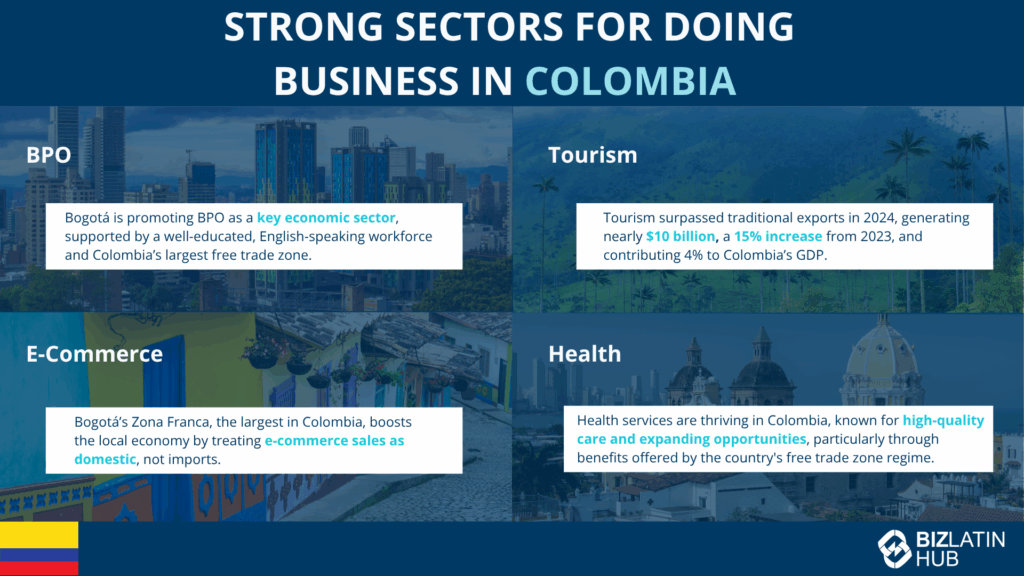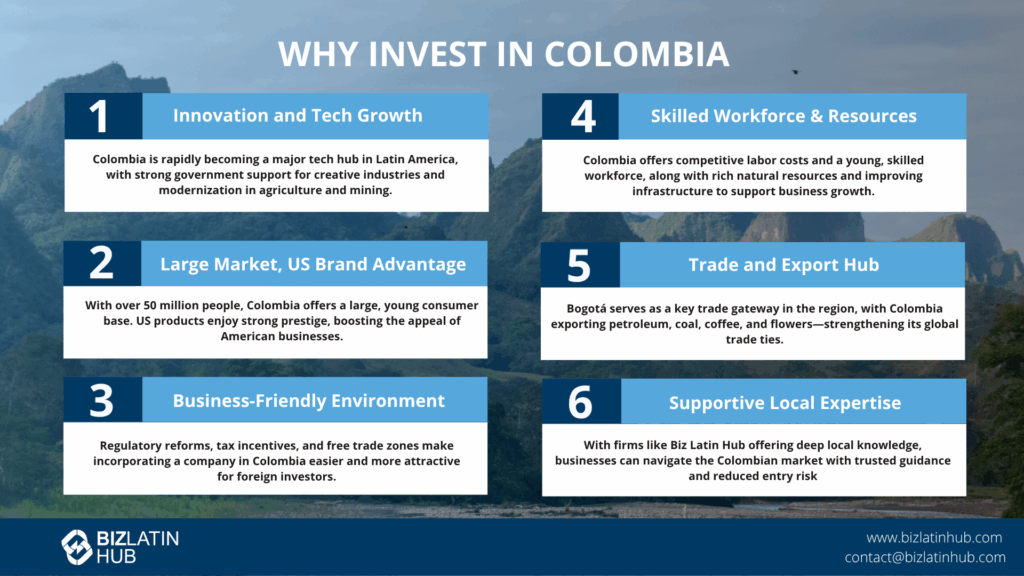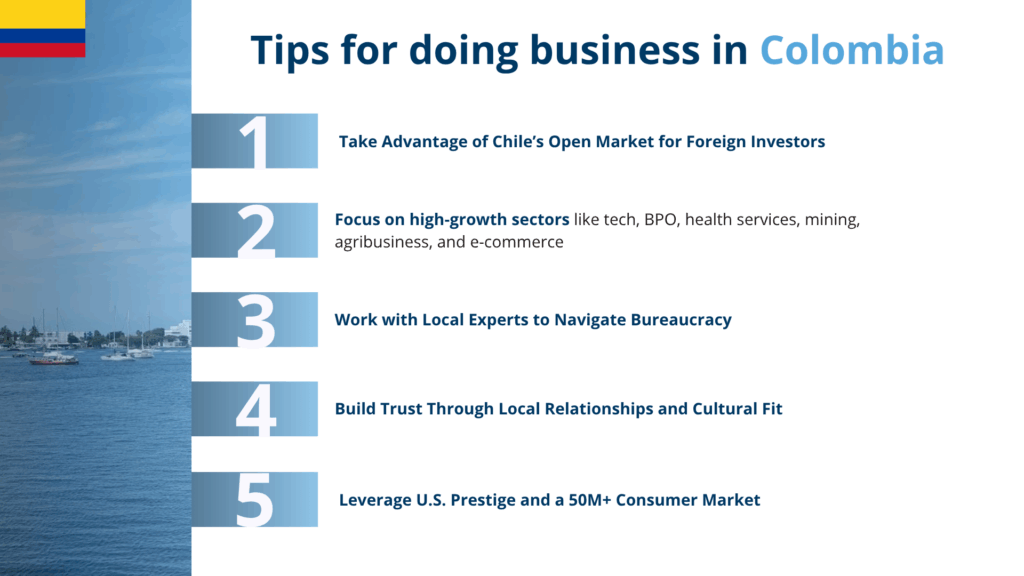Considering doing business in Colombia in 2025? This guide offers strategic tips for U.S. companies on market entry, legal setup, cultural alignment, and regulatory compliance.
Doing business in Colombia in 2025 remains a strategic choice for U.S. companies looking to expand into a fast-growing and investment-friendly Latin American economy. As the third largest economy in Latin America, Colombia is poised for drastic modernization and technological innovation. The country’s developing business environment offers valuable opportunities for companies looking at company formation in Colombia in the foreseeable future. The country has some quirks to understand, though, which is why it makes sense to research first and partner wisely. Companies doing business in Colombia benefit from strong trade ties with the U.S., a skilled bilingual workforce, and one of the region’s most diversified economies.
Key takeaways on doing business in Colombia
| Is foreign ownership allowed in Colombia? | Yes, foreign investors can own 100% of a business. |
| Most important sectors in Colombia | The country’s main exports include coffee, petroleum, and cut flowers. In the services sector, healthcare, tourism, medical tourism in Colombia, BPO and e-commerce are all developing fast. |
| Are there Free Trade Zones in Colombia? | There are 120 free trade zones distributed around the country. |
| What incentives for Foreign Direct Investment in Colombia exist? | The government offers tax incentives and has established free trade zones for foreign entrepreneurs to incentivize company incorporation. |
| What international links does the country have? | Colombia is part of the Community of Andean Nations, an associate of Mercosur and in the OECD and WTO. There are a range of free trade deals with various countries. |
Identify the market potential for doing business in Colombia
Colombia’s natural riches make it one of the most biodiverse in the world, and this is reflected in its trade. The country’s main exports include coffee, petroleum, and cut flowers. Colombia benefits from free trade with the US thanks to a solid partnership, and the US is also its largest import partner.
Colombia has two types of free trade zone, single-company (special permanent) and multi-company (permanent). Together, there are a whopping 120 free trade zones distributed around the country, with the vast majority (79) being single-company operations.
Decree 278 made it much faster to set up a free trade zone, which can now be done in around nine months and also opened up the possibility of changing use in the future. Up to 50% of the workforce can now work remotely, which was a major change aimed at promoting service provision in free trade zones.
For foreign executives doing business in Colombia, it’s important to understand that business relationships are highly personal and trust-driven — in-person meetings often carry more weight than emails or contracts alone.
The capital, Bogotá, is especially focused on building BPO as a key area for its economic future. The city has a large number of graduate-level young people, often with good proficiency in English. The Zona Franca of Bogotá is the biggest free trade zone in Colombia. Boosting this is that e-commerce sales from the free trade zones are not considered to be imports, plugging them directly into the local economy.
Health services are also a booming sector. Colombia is rightly very famous for the quality and reach of its medical care and this is opening up new possibilities, some of taking advantage of the various benefits that the free trade zone regime in Colombia provides.

Seven things to know before doing business in Colombia
1. Technology and innovation
Great potential lies in Colombia’s penchant for technology and innovation, which is supported by the Orange Economy initiative. This initiative aims to facilitate the growth of the nation’s ‘creative’ industries, which include media, culture, visual arts, and software development. This push for greater creativity and innovation has seen Colombia rise to become one of the largest tech hubs in Latin America.
Another key area for commercial potential lies in the modernization of Colombia’s staple sectors, such as mining and agriculture. Though it’s one of the most diverse countries on the planet, Colombian agribusiness or mining actors don’t necessarily have the most effective or efficient methods of operation. Colombia is ready to introduce new technologies to support its farming families and mining companies implement sustainable, efficient business practices.
There’s great potential for US companies doing business in Colombia in the coming years, across a range of traditional and emerging sectors.
2. Understand your visa requirements
In 2017, Colombia restructured its visa program, establishing 3 different types of visas for individuals. Make sure to partner with an experienced local lawyer who can offer guidance on which of the available business visas best suit your needs, and explain the requirements and your responsibilities under that visa.
Foreign employees in Colombia
Note that once your foreign hires receive their working visa, they will need to obtain a cedula – this is the local form of identification. This is mandatory for foreign people working or doing business in Colombia. You’ll need this cedula to open a bank account, and salespeople may even ask for it in stores when making larger purchases such as televisions and mobile phones.
Reforming visa processes
As neighboring Venezuela continues to grapple with economic and political issues, the Colombian government has taken actions to ensure that Colombia is integrating Venezuelan migrants by reforming the visa process to ensure that they can be employed, start their own businesses, and enroll in schools and higher education.
Government spending to accommodate for the influx of migrants has been flexible, as it’s viewed favorably for labor, due to domestic demand for services. Be aware that during this time, some visa processes may change, affecting your own requirements for obtaining a visa. Working with a trusted legal expert will ensure you are up to date on any changes to foreign investor and business visa policies.
3. Expect bureaucracy
Successive Colombian governments are taking steps to weed out corruption, but they’re not there yet. Complex bureaucratic procedures are therefore commonplace in Colombia, and the legal frameworks behind setting up a company, obtaining visas and bank accounts, and tax procedures are not all straightforward.
To incorporate a company in Colombia, you must partner with a local lawyer to ensure you’re doing what you need to in order to comply with the law. Avoid unexpected hurdles and administrative delays with the right support to save time and cost.
Many of the required procedures for doing business in Colombia involve physical interaction with agencies, including the Public Notary who apostilles or ‘notarizes’ company and personal documents. Most of the official documentation for yourself and your company must also be translated into Spanish.
Local Insight for 2025:
U.S. companies that localize their approach — hiring Colombian managers, customizing services for local consumers, and committing to in-person engagement — tend to build stronger partnerships and long-term success.
4. Speak the language
Being able to speak at least some Spanish will instantly improve the ease of your interactions with local institutions and employees. Though you can expect to find a talent pool of skilled workers in Colombia that have learned English, you’ll also encounter many who are Spanish-speaking only.
Not being able to communicate in the local tongue will slow you down, and make it difficult to engage with Colombian authorities during the company incorporation and visa processes. Understanding Spanish will also support your social integration into the country. In Colombia, even business partnerships rely heavily on strong interpersonal connections.
5. Cash transactions dominate
Building credit is notoriously difficult for the typical Colombian or foreign resident. Upon observation, many consumers still pay with cash. The idea of building credit and paying with credit is not the same in this country as it is in the United States. High-interest rates, bank fees, and heavy bureaucratic tape turn people off using electronic financial mechanisms. Though these attitudes are starting to shift in the central business districts with the introduction of fintech (financial technology) innovation, dealing in cash is still a widespread practice in Colombia.
One common way to build credit in Colombia is starting a pre-paid cell service plan. Note that you’ll need the cedula mentioned above (under the visa requirements section) to open credit.

6. The American brand carries high prestige
American influence remains strong in this nation, which improves chances for success for US companies doing business in Colombia. The influence is palpable: you’ll hear US artists on the radio, films on big screens, and brands on menus, clothing, and billboards. The US brand is highly respected and in-demand among local consumers.
Companies with US origin can enjoy that extra added value of their product or service to Colombians.
7. Take advantage of a consumer market of 50 million
Colombia boasts a population size of over 50 million people. Colombia’s capital, Bogotá, holds a sizeable workforce that is young, skilled, and educated. That number is only rising as higher education institutions also see sustained, continued enrollment. The working age population accounts for approximately 80% of the overall population.
US companies have many opportunities to pursue in Colombia, and their success is supported by a high demand for the American brand. The government’s modernization agenda welcomes new tech, infrastructure, and innovative business models. Don’t wait for competitors to identify and capitalize on this thriving market; engage with local legal providers and ensure success for your expansion by doing business in Colombia.
Why Colombia Is a Strategic Market for U.S. Businesses in 2025
Colombia remains one of the most attractive destinations for U.S. companies expanding into Latin America. With a growing middle class, strong institutional frameworks, and a strategic location with Pacific and Atlantic trade access, it serves as a natural hub for regional operations.
Reasons U.S. businesses are choosing Colombia:
- Free Trade Agreement with the U.S. – Since 2012, Colombia has eliminated tariffs on over 80% of U.S. goods and services.
- Robust startup and tech ecosystem – Medellín, Bogotá, and Cali have emerged as innovation centers with government support for digital transformation.
- Educated and bilingual workforce – Particularly in business services, software development, and back-office operations.
- Improved infrastructure and logistics – Ongoing investments in airports, roads, and ports are making regional trade easier.
- Ease of doing business – Colombia consistently ranks among the top countries in the region for starting a business and protecting investor rights.
Local Tip:
U.S. companies are often perceived as premium providers — but success depends on adapting pricing strategies and management styles to local expectations and relationship-driven negotiation styles.

Why choose Colombia to incorporate a company?
Biz Latin hub can help you enter this dynamic economy as smoothly as possible, as our depth of knowledge is unparalleled in the country. One of the most important steps when doing business in Colombia is selecting the right legal entity and ensuring full compliance with DIAN (tax authority) and the Chamber of Commerce.
The substantial number of young and skilled workers leads to competitive labor costs. Colombia’s growing workforce is a big reason businesses have been looking to expand into the country.
Colombia has made significant strides in improving its business climate through regulatory reforms that simplify bureaucratic processes and provide incentives for foreign investment. For example, the government offers tax incentives and has established free trade zones for foreign entrepreneurs to incentivize company incorporation.
Colombia has abundant natural resources, especially agriculture, mining, and renewable energy. The ongoing enhancements in infrastructure and transportation networks also streamline business operations.
Additionally, the country’s diverse and growing consumer base makes Colombia a promising market for companies seeking growth in Latin America.
FAQs on doing business in Colombia
Answers to some of the most common questions we get asked by our clients.
1. Can a foreigner own a business in Colombia?
Yes, a business can be 100% foreign-owned by either legal persons (legal entities) or natural persons (individuals).
2. Are there Free Trade Zones in Colombia?
| Colombia has two types of free trade zone, single-company (special permanent) and multi-company (permanent). Together, there are a whopping 120 free trade zones distributed around the country, with the vast majority (79) being single-company operations. |
3. How long does it take to register a company in Colombia?
Registering a company in Colombia takes four weeks.
4. Which sectors are important in Colombia?
The country’s main exports include coffee, petroleum, and cut flowers. Colombia benefits from free trade with the US thanks to a solid partnership, and the US is also its largest import partner.
The capital, Bogotá, is especially focused on building BPO as a key area for its economic future. The city has a large number of graduate-level young people, often with good proficiency in English. The Zona Franca of Bogotá is the biggest free trade zone in Colombia. Boosting this is that e-commerce sales from the free trade zones are not considered to be imports, plugging them directly into the local economy.
Health services are also a booming sector. Colombia is rightly very famous for the quality and reach of its medical care and this is opening up new possibilities, some of taking advantage of the various benefits that the free trade zone regime in Colombia provides.
5. Does Colombia have trade agreements with other countries?
| Colombia is part of the Community of Andean Nations, an associate of Mercosur and in the OECD and WTO. There are a range of free trade deals with various countries. |
6. What entity types offer Limited Liability in Colombia?
Both the Sociedad por Acciones Simplificada (S.A.S) and Sociedad de Responsabilidad Limitada are Limited Liability Companies in Colombia.
7. Why are U.S. companies investing in Colombia in 2025?
Colombia offers strong U.S. trade relations, a growing middle class, and an ideal location for regional expansion into Latin America.
8. What are common challenges U.S. firms face when doing business in Colombia?
| Adapting to Colombia’s business culture, managing bureaucratic processes, and staying up to date on tax reforms are key challenges. |
9. How long does it take to set up a company in Colombia?
On average, 4 to 6 weeks — faster with legal assistance and properly prepared documentation.
Do business in Colombia with Biz Latin Hub
It’s important for entrepreneurs and investors to know their rights, responsibilities and obligations under Colombian law in order to make the most of this exciting commercial environment. Though opportunities are many and various in the country, you’ll first need to take all necessary steps to incorporate your company and comply with commercial, taxation, visa, and other regulations.
Biz Latin Hub supports U.S. companies doing business in Colombia with incorporation, visa processing, payroll, legal compliance, and local market strategy.
At Biz Latin Hub, our team of local and expatriate experts in Colombia have the depth of experience and knowledge needed to ensure you can start commercial operations as quickly as possible. We offer a full suite of market entry and back-office services that are customized to your business needs. We’ll ensure your business is compliant with local law every step of the way.
Reach out to us today here at Biz Latin Hub for advice on how we can enable you to do business in Colombia.
Learn more about our team and expert authors.






